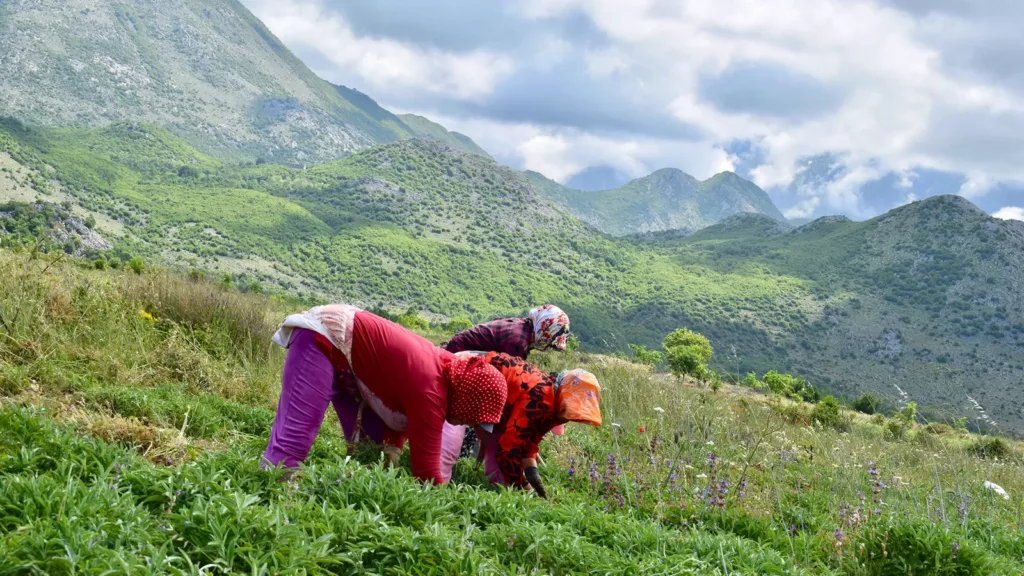While Albanian wild-gathered herbs are sought-after internationally, the industry offers great economic opportunity and independence for women like Donika Musaj.I
It was a rushed start for my morning journey, and I was still fiddling with pots of cream and tubes of sunscreen as the minibus set off. I was leaving the Albanian town of Kukës for what I had been warned would be two bumpy hours of travel into the highlands. Our bus was filled over capacity with people and their bundles. The passengers had the clear skin and great bone structure I am used to seeing in the men and women of the mountain regions of Albania’s north, but their luggage surprised me.
50 REASONS TO LOVE THE WORLD – 2021
Why do you love the world?
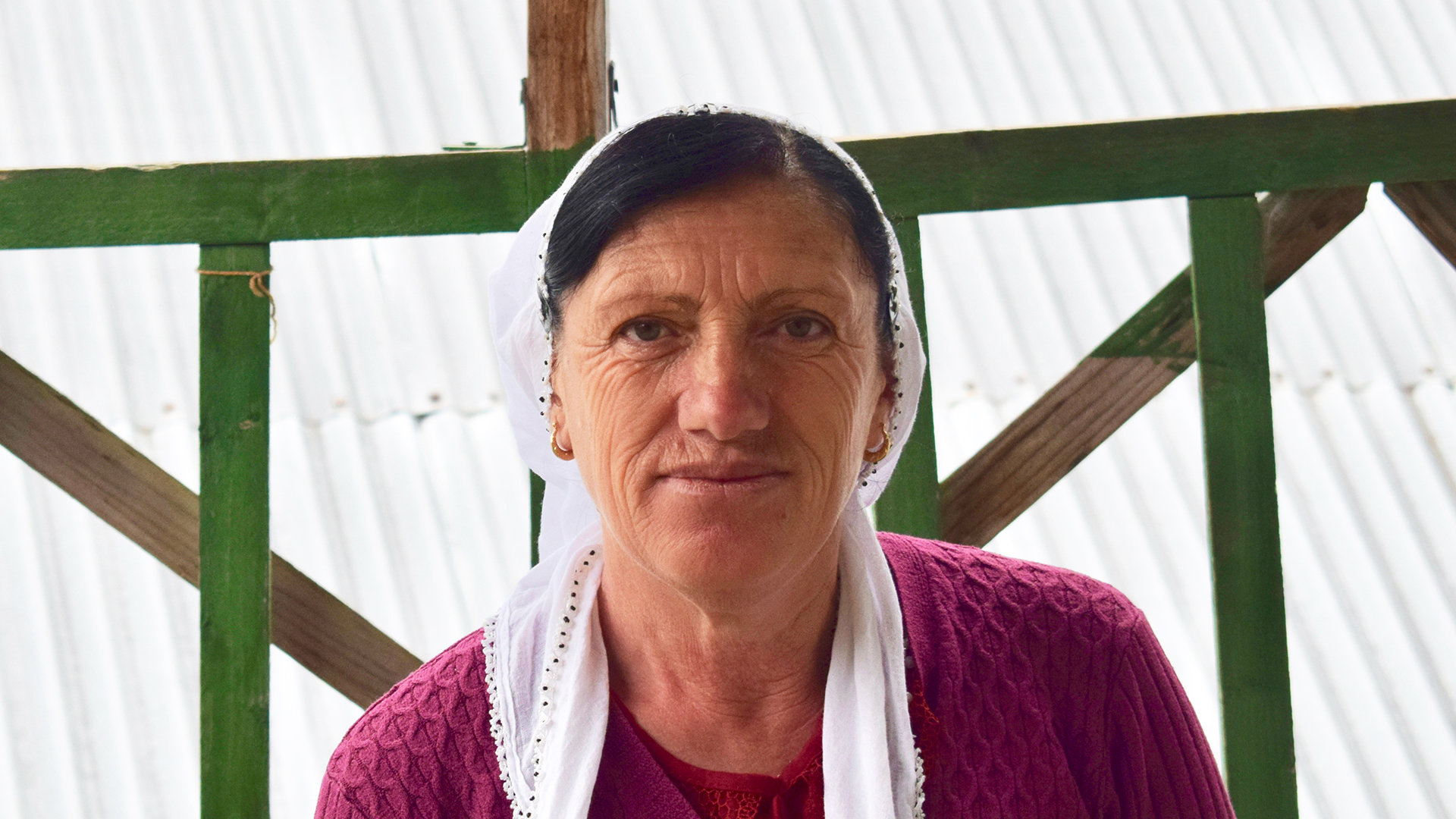
“Because here, you can drink your fill of the air. Food tastes better, and everything around us is ours: we make it ourselves.” – Donika Musaj, wild medicinal & aromatic plant collector
More Reasons to Love the World
There is a dreadful saying from Albania’s traditional Kanun of rules determining communal life that “woman is a sack to be well-used”. But here, the wiry women in their demure headscarves and long black plaits were the ones well-using the sacks, hefting them into the bus and around their persons. Next to me, a woman had a carrier bag swelling yeastily with half a dozen large loaves of simple white bread fresh from a bakery. In front of her was the woman I heard arguing with the driver beforehand over stowing a huge fragrant bedsheet knotted around a billowing mass of stalks and flowers, some of which were littering the floor of the minibus.
Luckily for my curiosity, a woman – who later introduced herself simply as “Naim’s wife”, in an indicator of the area’s lingering traditional views towards women – was keen to tell the whole minibus about just what was in that pillowy pile of herbage she was bringing back home from Kukës.
“Without the stalks, they said! Last year they were happy to have the stalks! But now apparently, it’s not acceptable. So, the whole lot has to come home again. I’ll probably just feed it to the sheep.”
It turned out she was talking about cowslips, one of the many medicinal plants that are wild harvested in Albania. Her bundle was denied because she had picked the stalks instead of just the flowers, apparently a new, unforeseen rule at the market where she’s come to sell her flowers.
“So, do you go out collecting the flowers?” I asked.
The whole minibus answered me: “yes!”
Once my interest had become clear, the journey became an illustrated lecture. For example, cowslips – Naim’s wife scattered some dried yellow flowers into my hand – are known locally as finger flowers. “Look at the way the flowers cluster like a hand,” she said.
The man in front of me pointed out of the window. “Elderflower. One euro per kilo.”
Someone else joined in: “And hawthorn flower – collecting that one’s tough on the hands.”
I was learning a new way to parse the countryside.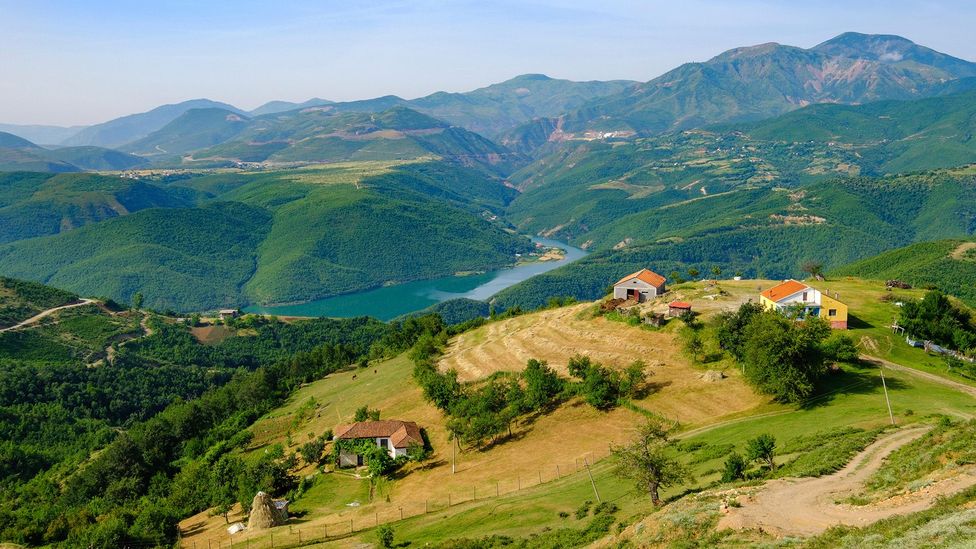
The city Kukës is tucked in the mountainous highlands of north-eastern Albania (Credit: imageBROKER/Alamy)
All of the flowers these collectors found eventually made their way off the mountains and down to Kukës to be sold for export. But I asked my fellow passengers, how did they themselves use what they picked?
Perhaps I should have guessed the answer – our minibus’ destination was a village called Çajë, pronounced chai. I was travelling to a village called “Tea”.
This area is typical of much of Albania, which is 77% mountainous, and benefits from a Mediterranean climate and land that had little chemical contamination during the tough Communist years that ended in the early ’90s. All these factors make Albanian wild-gathered herbs particularly sought-after internationally. The industry offers great economic opportunity for the women who were on my bus, though their harvests need to meet international standards such as not having too much unusable material – like stalks.
When I arrived at Donika Musaj’s family’s guesthouse, Bujtina Musaj, I hoped I might be greeted with some of Albania’s signature so-called “mountain tea”, a comforting brew, as yellow as lamplight, that’s made from the ironwort plant, Sideritis syriaca. Instead, I was served a darker tisane made from dried bilberries. “We collected 100kg of bilberries last year,” said Musaj as I sipped appreciatively at the concentration of fruity antioxidants, with its underlying musky taste.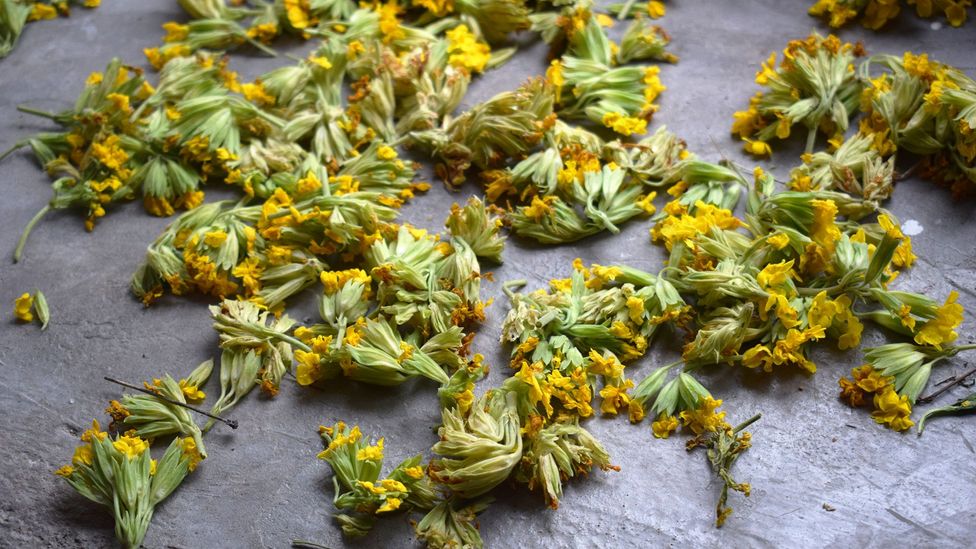
Cowslips are used by cosmetics companies for their properties for preserving skin tone (Credit: Elizabeth Gowing)
This family, and those represented on the minibus, were just some of the more than 100,000 Albanian households involved in the cultivation or harvesting of medicinal and aromatic plants. Across the country, that’s roughly one in every seven homes linked to this sector, which generates up to $28 million (over £20 million) in exports. Between 2018 and 2019, that was made up of 12,000 tonnes of cowslips, bilberries and other plants in demand by foreign gastronomy and pharmaceutical markets.
“Come and see,” Musaj said and took me upstairs to show me the latest contribution to that vast tonnage. Her upper balcony has turned yellow with a carpet of cowslips drying in the warm summer air. It was as if she had brought a particularly rich meadow into her home. I checked anxiously for stalks, but Musaj knew to pick only the flowers – when this lot was tied in a sheet and taken into Kukës, there would be no risk of them being turned down.
You may also be interested in:
• The berry that keeps Asia looking young
• Croatia’s pristine isle of wellness
• What can Albania teach us about trust
And on they would go from Kukës, via middlemen and exporters, to the companies abroad who are hungry for good quality wild-gathered primula veris. The withered papery buds may not seem a likely ingredient for toners, serums and eye masks with epithets like “brilliance” and “skin perfecting”, “brightening” or “anti-aging”, but those products we see in our beauty magazines depend on the cowslips dried on these Albanian balconies, humped into minivans and then, with a fair wind, blown out into the world.
I thought of the little white pot of cream I put on this morning and wondered how many hours it took to make.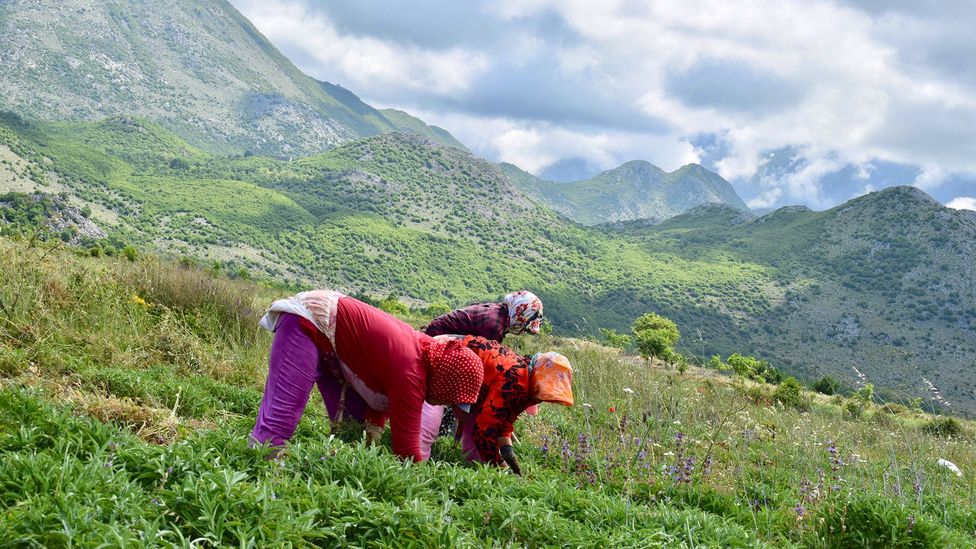
Women herb collectors harvest from May to September in Albania (Credit: Elizabeth Gowing)
“We go out from 8am to 6pm in the season,” Musaj told me. I could see women dotting the hillsides, armed with curved knives that gave them a piratical look, and wearing their collecting sacks as aprons. “This is what we do from May to September. From October, the snows come and there are no flowers. Our priority then is the animals.”
Musaj’s husband, Xheladin, chipped in. “We love it here. I love the fresh air. I don’t want to have to go to a corner shop. I don’t like Coca-Cola. I have my own organic version – the yoghurt drink called dhallë.”
Dinner offered a mouth-watering display of just what the family does have: sorrel pie, homemade cheese, home-grown tomato salad, roasted home-grown peppers.
“Even the sheepskin you’re sitting on,” Musaj gestured to the comfortable cushions against which I was reclining. “That was our sheep.”
I shifted a little uneasily in my place.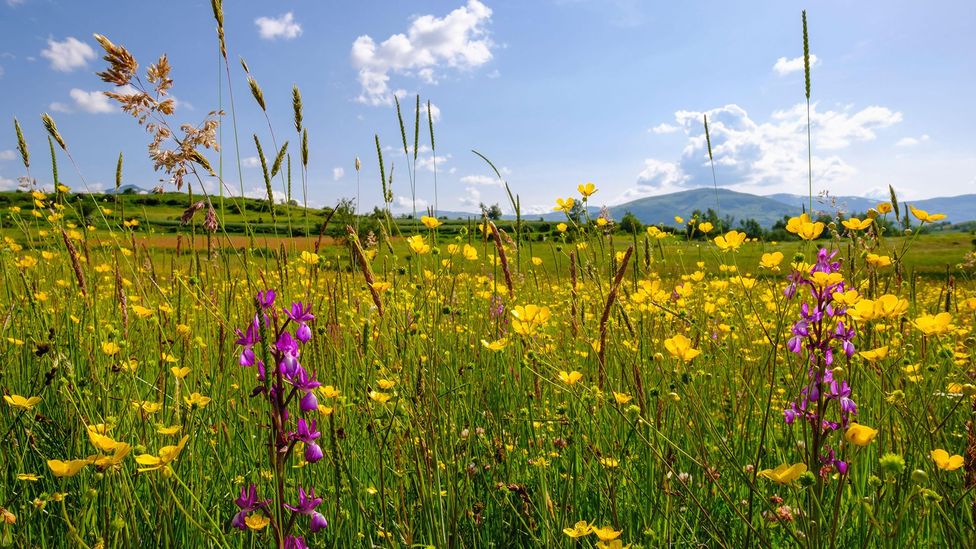
Albanian wild-gathered herbs are sought-after internationally (Credit: Mauritius Images GmbH/Alamy)
“And the bread. The nearest bakery is two hours away. So, the bread is homemade too,” she said. The mystery of the plump bags on the bus was solved. Those simple loaves were a precious labour-saving takeaway, to bring back from town when you got the chance.
After we’d eaten, I went out into the evening with Musaj’s son, Ardian. Dusk was falling and, through the gloom, an ancient scene materialised. A string of weary horses, bulging with the nylon sacks strapped around them, were being led by equally weary-looking men down from the pastures above the village. Ardian explained what I was seeing.
“They’ve spent yesterday and today foraging for flowers and spent the night in their mountain huts.”
The women collectors don’t go as far afield as the men do. But although their geographical range may be more circumscribed, the independence that the medicinal and aromatic plant economy offers to women like Musaj – despite other factors pushing them into more traditional roles – is very clear.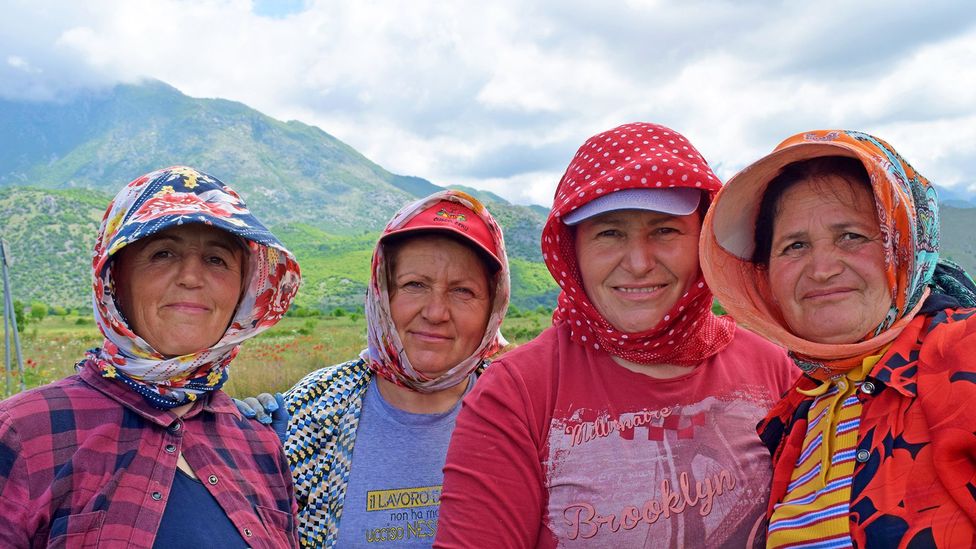
Albania’s aromatic plant industry offers economic opportunity and independence for women (Credit: Elizabeth Gowing)
Anila Aliaj from the NGO, Connecting Natural Values with People (CNVP) – which has a project developing this sector with Swedish Embassy funding and currently working with more than 1,000 farmers – explained more about what the collecting sacks and cutlasses make possible. “This sector gives opportunities to women to have an income and to become economically independent of their husbands,” she said. “But women shouldn’t just be workers who gather the plants, but also decision-makers in trading the product.” The majority of the farmers her project works with are women.
Aishe Ivani, the Çajë village nurse, echoed how medicinal plants help her community with independence. She also goes out gathering the plants in her spare time, and she says that with access to “the nature God has blessed us with, we’re our own doctors”. At 53 years old, she’s another woman whose skin I admire, and I asked her whether she thought the cowslips had anything to do with the bloom in her cheeks. However, it seemed she had a greater belief in nutrition than the contents of that little white pot I was pinning my anti-wrinkle hopes on. “It’s organic food that keeps me young.”
For those of us who find it easier to incorporate into our wellness regime something in the bathroom cabinet rather than the kitchen cupboard, Albania’s mountain plants offer one other hope. The oil of the so-called “everlasting flower” of helichrysum is another ingredient in “restoring” night serums and “regenerating” facial products. Like the cowslips, this is another plant grown in this clear mountain air and used by cosmetics companies around the world for its properties for preserving skin tone.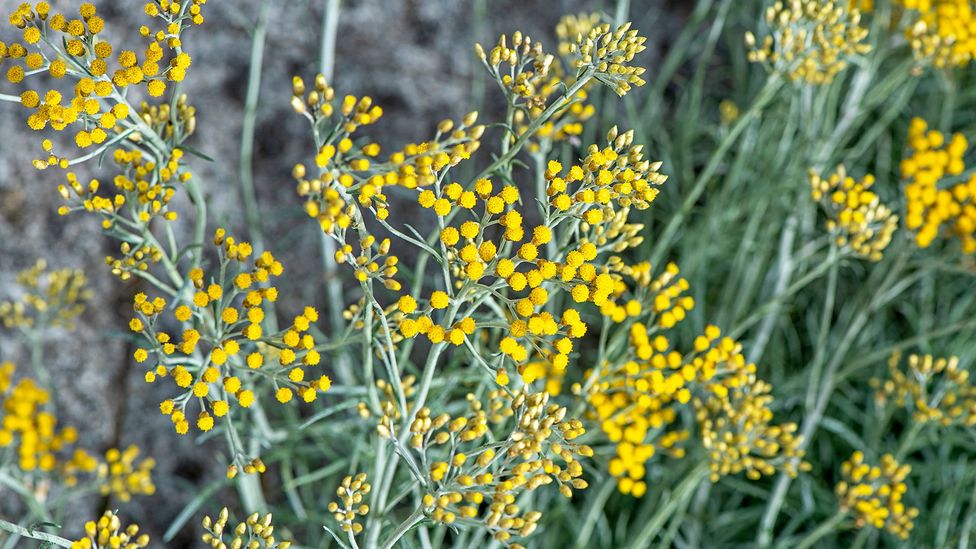
Helichrysum, known as “everlasting flower”, is an ingredient in night serums and other facial products (Credit: Jacky Parker Photography/Getty Images)
As I ventured even further north in Albania, at the side of the road I found another group of women with beautiful complexions pulling up leaves. They said they had travelled here from a nearby village called Gruemirë – the name translates as “Good Woman”. They were working on helichrysum, and I asked if I could take a photograph of them.
“Yes, but please make me look beautiful,” one of them called out with a smile.
Thinking of the precious oils and petals they supply in a direct line to our cosmetics companies; it makes more sense for me – for all of us – to be asking this of them.
BBC Travel celebrates 50 Reasons to Love the World in 2021, through the inspiration of well-known voices as well as unsung heroes in local communities around the globe.
—
Join more than three million BBC Travel fans by liking us on Facebook, or follow us on Twitter and Instagram.
If you liked this story, sign up for the weekly bbc.com features newsletter called “The Essential List”. A handpicked selection of stories from BBC Future, Culture, Worklife and Travel, delivered to your inbox every Friday.
